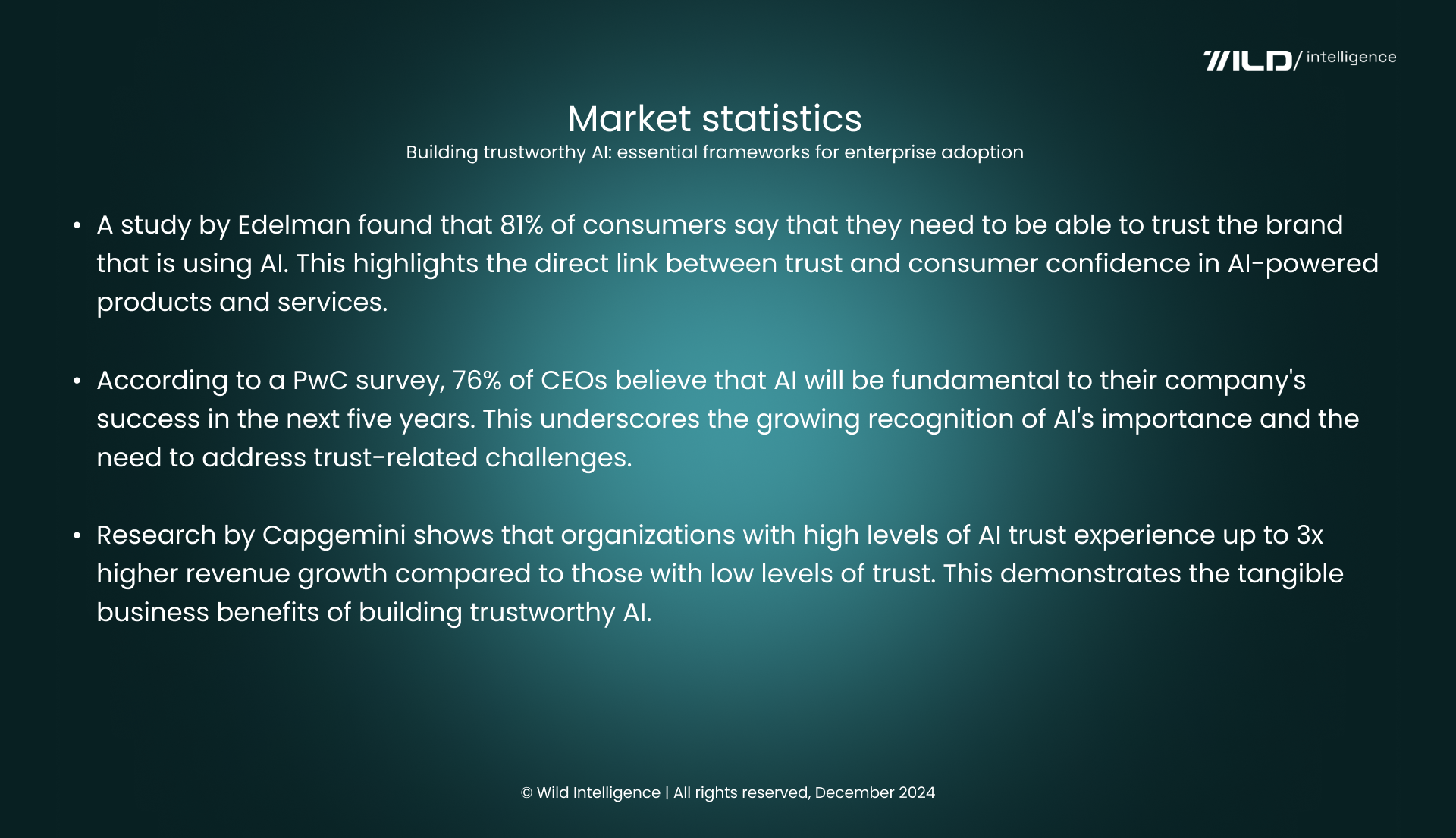Building trustworthy AI: essential frameworks for enterprise adoption
Hello,
Building trustworthy AI systems is not just an ethical imperative; it's crucial for driving adoption, ensuring long-term success, and mitigating risks.
Trustworthy AI is built on key pillars: fairness, transparency, accountability, privacy, and security. These principles must be embedded throughout the AI lifecycle, from design and development to deployment and monitoring.
Fairness ensures that AI systems do not perpetuate biases or discriminate against certain groups. Transparency requires that AI decisions are explainable and understandable to humans.
Accountability means establishing clear lines of responsibility for AI outcomes.
Privacy safeguards sensitive data in AI systems, while security protects AI systems from malicious attacks and manipulation.
By embracing these principles, enterprises can foster trust among customers, employees, and stakeholders, paving the way for wider AI adoption and greater societal acceptance.
Case Study: Mayo Clinic - Pioneering trustworthy AI in healthcare
Mayo Clinic is a healthcare provider at the forefront of integrating AI into clinical practice. It has implemented a framework for trustworthy AI.
Recognizing AI's transformative potential while acknowledging its ethical complexities, Mayo has prioritized building trustworthy AI systems that enhance patient care and strengthen trust.
This includes rigorous validation of AI models, clear communication with patients about the use of AI, and ongoing monitoring for bias and fairness.
This approach has improved patient care and strengthened trust in the organization's use of AI.
Key initiatives:
Rigorous validation: Mayo Clinic employs a rigorous validation process for all AI models used in clinical settings. This includes extensive testing and validation on diverse datasets to ensure accuracy, reliability, and generalizability.
Explainability and interpretability: Mayo emphasizes the importance of understanding how AI models arrive at their conclusions.
This involves using explainable AI (XAI) techniques to provide insights into decision-making, enabling clinicians to understand and trust the AI's recommendations better.Patient communication and consent: Mayo prioritizes clear and transparent communication with patients about using AI in their care. This includes providing information about how AI is used, the potential benefits and risks, and obtaining informed consent when necessary.
Ongoing monitoring and auditing: Mayo has implemented a robust monitoring and auditing system to ensure that AI models remain unbiased and fair over time. This includes regular checks for potential biases, performance drift, and unintended consequences.
Collaboration and multidisciplinary approach: Mayo fosters a collaborative approach to AI development and deployment, involving clinicians, researchers, ethicists, and patients. This ensures that AI systems are aligned with clinical needs and ethical considerations.
Outcomes:
Improved patient outcomes: By leveraging AI, the Mayo Clinic has significantly improved patient care, including faster and more accurate diagnoses, personalized treatment plans, and efficient clinical workflows.
Enhanced trust and transparency: Mayo's commitment to trustworthy AI has strengthened trust among patients and clinicians. This has fostered greater acceptance of AI in healthcare and paved the way for broader adoption.
Leadership in responsible AI: Mayo Clinic has emerged as a leader in responsible AI in healthcare, setting a benchmark for other organizations to follow. Its approach to AI governance and ethical considerations has garnered recognition and praise from industry experts and regulators.
Key takeaways:
Mayo Clinic's experience demonstrates that trustworthy AI is achievable in healthcare.
By prioritizing rigorous validation, explainability, patient communication, ongoing monitoring, and collaboration, healthcare providers can harness the power of AI to improve patient outcomes while maintaining the highest ethical standards.
This approach strengthens trust and paves the way for a future where AI plays a central role in delivering safe, effective, and equitable healthcare.
What's next and considerations
Future trends:
Explainable AI (XAI) will become increasingly important. As AI systems become more complex, the ability to understand their decision-making processes will be crucial for building trust.
The focus on human-centered AI will grow. This approach emphasizes the importance of human oversight and collaboration in AI systems, ensuring that AI serves human needs and values.
Regulations will play a key role in shaping trustworthy AI. The EU AI Act, for example, includes provisions for risk management, transparency, and human oversight.
Actionable recommendations:
Establish clear ethical guidelines for AI development and deployment.
Implement robust data governance practices to ensure data quality and privacy.
Invest in XAI tools and techniques to make AI decisions more transparent.
Foster a culture of responsible AI within the organization through training and awareness programs.
Engage with stakeholders to build trust and address concerns about AI.
By embracing these recommendations, enterprises can build trustworthy AI systems that drive innovation, enhance customer experiences, and contribute to a more equitable and sustainable future.



